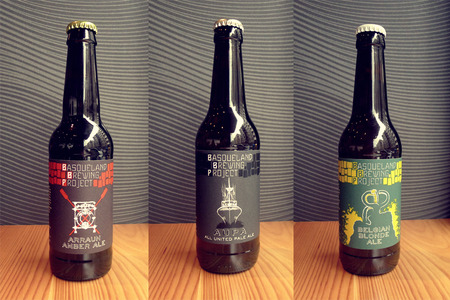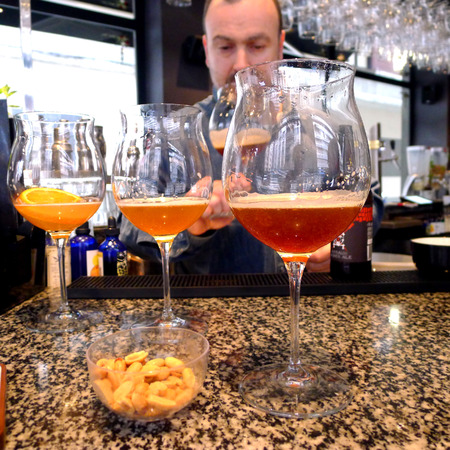Basqueland Brewing Project
There's a new beer on the block, everybody.
Basqueland Brewing Project was founded by a couple of Americans living in Donosti, whose passion for all delicious things in life (one works in wine and the other heads La Madame, a restaurant recently featured in The New York Times) has led them to brew their own line of craft beer.
BBP's new line premiered in February and is slowly taking over the finer bars of San Sebastián. The first offering consists of three brews, engineered by American brewmaster Ben Matz:
Belgian Blonde Ale: A bière blanche, true to the Belgian style, with beautiful citrus notes and a bit of smoke. Light-bodied and refreshing.
- alcohol: 4.8%
- in the bottle: pilsner and crack wheat malts; the hops used to craft are Saaz and Perele.
- recommended for: anybody, anytime
- pairs well with: anything. seriously. It goes down great solo, but its light acidity makes it an easy pair with almost any food (a la cava or champagne)
Aupa All United Pale Ale: A well-hopped but exceptionally balanced west-coast pale ale. Abundant aromas, medium-bodied, and rich golden color. Very sessionable.
- alcohol: 5.5%
- in the bottle: dry-hopped with cascade, columbus
- recommended for: wanna-be hop converts
- pairs well with: charcuterie, pate, chorizo, classic basque pintxos and/or fish dishes with lots of acidity (anchovies, sardines, grilled turbot etc.)
Arraun Amber Ale: This is a beer with some serious personality—nice, clear, great malt structure with a nose of passion fruit and leather. Fllavors of maple and fresh coffee grounds backed up by depth of hop.
- alcohol: 5%
- in the bottle: good deal of specialty malts and dry-hopped with simcoe
- recommended for: the most demanding of beer drinkers
- pairs well with: great for cheese courses, stands up to simple or gourmet burgers, grilled meats. Also pairs well with...nothing. It’s a great stand-alone beer.
I sat down with the guys behind BBP for a chat about what it's like starting up a brewery and the bigger challenge of bringing quality craft beer to a Spanish public.
What was the guiding principle behind your first range of beers?
These are basically "introductory beers". The idea of making all three of them was to make something low alcohol, easy-to-drink, that's not going to weigh you down or overpower you with the hoppiness.
Do you feel like you sold out at all, trying to make "easy" beers?
No, no, because Ben (Matz) is such a great beermaker that we can say, 'Hey, there's different syles of pale ale and this is the style that we want for this first round'. We want it to be one of our base beers.. and in the future once we get our own facilities/brewery here in the city we'll probably be doing lots and lots of low-production experimental beers.
How do you feel about the results?
We're very very happy with how it came out. We know that micro-craft beer movement is coming...we've got a good representation of what you can do. The ultimate goal is that we would eventually have our own facilities, that people like our beers enough that they give us funding to get our own brewery. Our goal is also promoting better beer drinking in places like Arzak, Martin, that don't have any beers to match the caliber of food.
What inspired you to make this project a reality?
It's about bringing different things to light. Maybe not everybody likes them, but the vast majority of the poeple do. They're thankful for it. The beer is the same way. It's very local, very personal. To be able to mke that happen here, to bring something this fresh and this good to people that really are passionate about good food and good living, it feels good.
Are there any challenges specific to Basque Country/Spain?
It's challenging with the beer monopolies here. Bar owners get paid not to buy any other beers. For the beer consumer, it's not really promoting better beer drinking.
What's "better", tap or bottle beer?
When you taste it off the tap it tastes a little fresher, with one caveat: the tap has to be very clean. People have infections in their tubing...if you go to a bar and the beer tastes buttery, that's a bad thing. There's also another infection that happens in barrel that tastes like green apple.
How important is freshness?
That freshness thing, it's impossible for a beer to be made fresh in the States in this style, be sent all the way over here, and to arrive in good conditions. To have the capability of making a great beer fresh and give it to people, that's something that is special.
Any *special* memories from the first round of brewing?
One day, brewing in La Rioja, we had a very special lunch. It was 4:30 and we'd been there since 6 a.m. with nothing to eat. We were starving. Some companions said, 'We're getting some sandwiches, do you guys like pigs' ears?' and we were like, 'Yeah, I do, you know, Borda Berri.' It coes back and it's like the soggiest, gelatinous thing ever. And we were like, 'Oh my God, this is the worst sandwich I've ever had'.
And any good memories?
One of the best moments since we started this project was when I went to Ganbara [in the old part of Donosti]. I had a pale ale outside of Ganbara with the tarta de txangurro. I thought, 'this is a great beer in this great city'. Now we have the luxury of having something we really love alongside a great beer with this taste profile.
Basqueland Brewing Project is on Facebook, Twitter, and Instagram, where they tend to post all the bars and shops that carry their beers, useful for all you microbrew fanatics. Beer in keg format can be found at Bar Neverstop and Bar Txiki. Bottles are widely available throughout San Sebastián.



